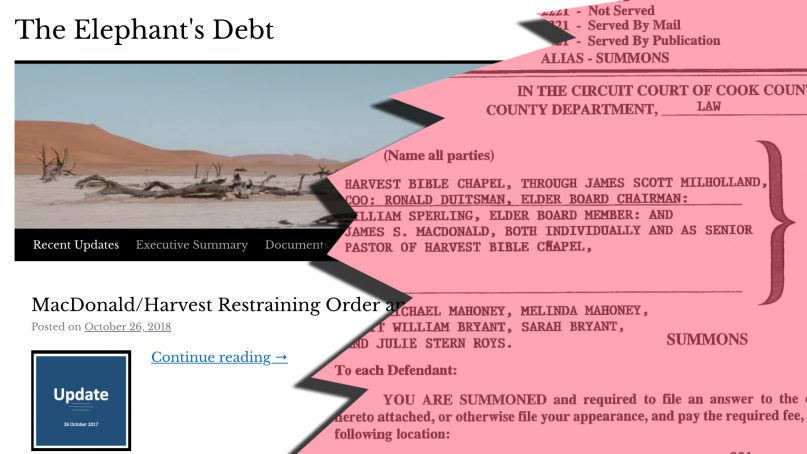(RNS) — For six years, two bloggers at a website called The Elephant’s Debt have raised questions about an influential evangelical pastor and his Chicago-area megachurch, criticizing his leadership style and the church’s finances.
Now, claiming that reputation-harming “false information” published by the bloggers caused 2,000 people to leave the congregation, pastor James MacDonald and Harvest Bible Chapel are fighting back — with a defamation lawsuit.
The suit names the bloggers, their wives and a freelance reporter writing about the church for a major evangelical magazine.
“We are indeed living in an age of rage, fueled by ‘fake news’ where the presumption of innocence has almost universally given way to the presumption of guilt,” MacDonald wrote recently in explaining the lawsuit to the church’s friends, including its 12,000 attendees at seven locations in Illinois.
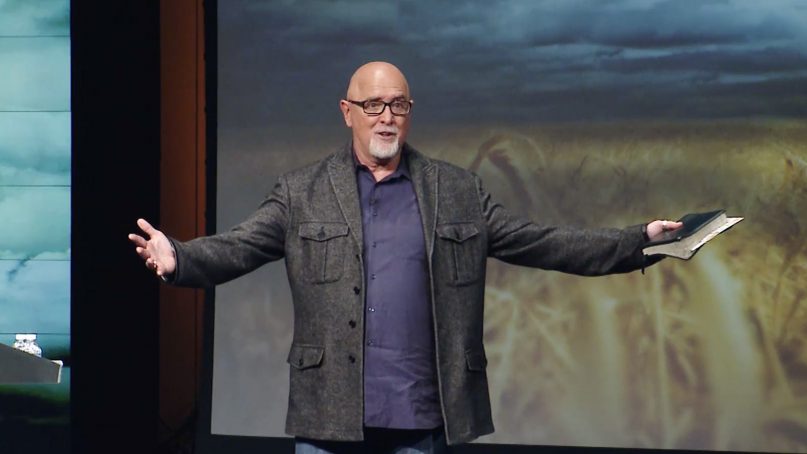
James MacDonald, founding and senior pastor, speaks at Harvest Bible Chapel. Video screenshot
“No more sitting by doing nothing while digital attackers ravage the body of Christ,” the pastor added later in the online statement. Through a public relations firm, MacDonald declined an interview request from Religion News Service.
In a number of posts over the years, bloggers Ryan Mahoney and Scott Bryant have cited what they characterize as the “low character,” “greed” and “love of money and power” of MacDonald, founding and senior pastor of Harvest Bible Chapel, which is based in Rolling Meadows, Ill. Mahoney is a former teacher at the church-affiliated Harvest Christian Academy. Bryant is a former Harvest Bible Chapel member.
The church disputes the way the bloggers have characterized MacDonald and their allegations about the church’s finances. The lawsuit claims Mahoney left the church after his Harvest Christian Academy contract was not renewed because of his criticism of MacDonald’s sermons. Bryant, the lawsuit claims, left “after being declined a teaching opportunity he repeatedly pursued.”
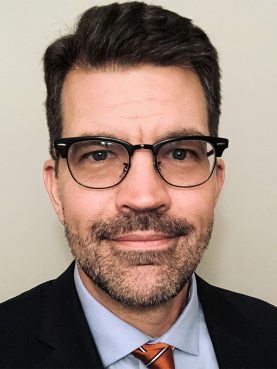
Ryan Mahoney. Courtesy photo
Mahoney and Bryant declined an interview request from RNS, citing the advice of counsel. They have defended their blogging on their site.
“While the authors of this website would never have chosen to resolve our differences in a litigious manner,” Mahoney and Bryant said at The Elephant’s Debt after the lawsuit was filed, “we are confident that the legal process will ultimately uphold the values of the first amendment right to freedom of religion, freedom of speech and freedom of the press, all of which are essential to safeguarding the values of the Protestant Reformation and our common life.”
The lawsuit, filed last month in the Circuit Court of Cook County in Chicago, lists five defendants: Mahoney and Bryant, their wives and Julie Roys, an independent journalist and former talk show host for Moody Radio, a Christian network.
“These bloggers have First Amendment rights to criticize the church,” said Kenneth Pybus, a journalist and lawyer who teaches media law at Abilene Christian University in Texas and reviewed the lawsuit at the request of RNS. “They don’t have First Amendment rights to lie about the church and damage the church’s reputation.”
However, a doctrine in the law called “substantial truth” could give protection to a “technically false” statement — such as the amount of a church’s debt — “if the gist of the message, or the overall message, is still true,” Pybus said.
Roys is accused of conspiring with The Elephant’s Debt authors and “asserting false allegations” against the plaintiffs, who include MacDonald and other church leaders. Roys referred questions to her attorney, Charles Philbrick, who said she has no connection with The Elephant’s Debt and “categorically denies any wrongdoing.”
“As to Mrs. Roys, the complaint doesn’t actually explain or show what it is that she said that was supposedly untrue,” Philbrick said, noting that Roys’ personal blog makes no mention of MacDonald and contains only a positive reference to Harvest Bible Chapel in an interview of a worship leader.
Until the lawsuit was filed, The Elephant’s Debt — a blog name inspired by The Elephant Room, a controversial theological conference run by MacDonald — had not published a new post since December 2017.

Journalist Julie Roys. Courtesy photo
However, Roys has been working on an as-yet-unpublished investigative piece for World magazine, its editor-in-chief, Marvin Olasky, confirmed. That evangelical news magazine, published every other week, has roughly 65,000 paid subscribers.
“At World, we don’t talk publicly about specific investigative stories until they’re published, because we put them through intensive fact-checking and some fall by the wayside,” Olasky said in an email to RNS. “We’ve run close to 100 investigative stories over the years and have never been sued, through God’s grace, and we hope to maintain that record. Please pray for us.
“In general, with great numbers comes great responsibility,” he added. “We regularly get reports from readers about problems in local churches, but we only take a deep look into concerns at megachurches.”
The plaintiffs asked a judge for a restraining order to stop the defendants from publishing information about MacDonald and the church while the lawsuit moves forward.
“Defendants’ false and defamatory statements have a negative impact on Plaintiffs’ ability to convert new persons to the faith, maintain their congregation and raise the funds necessary to operate,” the petition claims.
The judge denied the request.
The lawsuit’s timing has sparked a slew of speculation among some of the defendants’ fellow Christian bloggers.
Warren Throckmorton is a psychology professor at Grove City College, a Christian liberal arts institution in Pennsylvania. He often tackles religious issues on his personal blog and has referenced past controversies involving MacDonald.
“As a blogger, my feeling is that I check and double-check everything that I write, and I also contact the sources,” Throckmorton said. “I feel like that’s a good principle to follow.”
Throckmorton worries wealthy churches or ministries could use a lawsuit in an attempt to silence critics.
“Most bloggers don’t have deep pockets, so it can be a potent weapon,” he said of a potentially costly legal battle.
The Elephant’s Debt authors said in a blog post that they expect to incur “tens of thousands of dollars in legal expenses and other costs” as a result of the Harvest Bible Chapel lawsuit. Their supporters have donated more than $7,500 so far to a GoFundMe page created to help with their legal costs.
Meanwhile, MacDonald reported that two elders — not church offerings — are covering Harvest Bible Chapel’s lawsuit expenses.
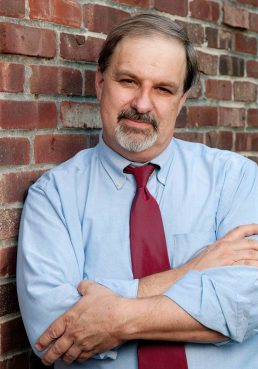
Mark Galli. Courtesy photo
For years, American evangelical pastors have looked to MacDonald “for inspiration for preaching and how to grow a church,” said Mark Galli, editor-in-chief of Christianity Today, a leading evangelical magazine. “But he’s also been criticized for the way he has built his multisite network (and) for how his church has sometimes managed their finances and publicly disciplined elders.”
MacDonald rose to prominence in part because of his ties with The Gospel Coalition, an influential evangelical group. He eventually split from that group, Galli said, over what MacDonald called “methodological differences.”
“In short, MacDonald is a megachurch pastor with a national reputation among evangelicals for ministry innovation but also for sparking controversy,” Galli said. “He’s not a figure that can be easily ignored in our world.”
In 2014, Harvest Bible Chapel publicly apologized for harshly censuring three former elders who resigned the church board in protest of what they said was a “culture of fear and intimidation” and a lack of transparency among church leadership, according to a previous World report.
In 2013, the church became accredited with the Evangelical Council for Financial Accountability, after questions were raised about Harvest’s finances.
Rusty Leonard, founder and CEO of the donor advocacy organization Ministry Watch, said becoming part of ECFA was a good move by Harvest.
Filing a lawsuit, Leonard said, was a “curious” move. He said the criticisms of MacDonald were an “old, old story.” He wonders if the church was worried that Roys discovered new information.
“Or maybe they’re just concerned that it’s going to be a rehash of old news that they don’t want to deal with anymore,” he said.
Before filing the lawsuit, church leaders sent emails to Roys and The Elephant’s Debt authors asking for private meetings to discuss the issues. Harvest Bible Chapel offered Roys “access to information that we cannot reveal publicly” that the church said “will prove satisfactory to a person seeking to maintain journalistic integrity.”
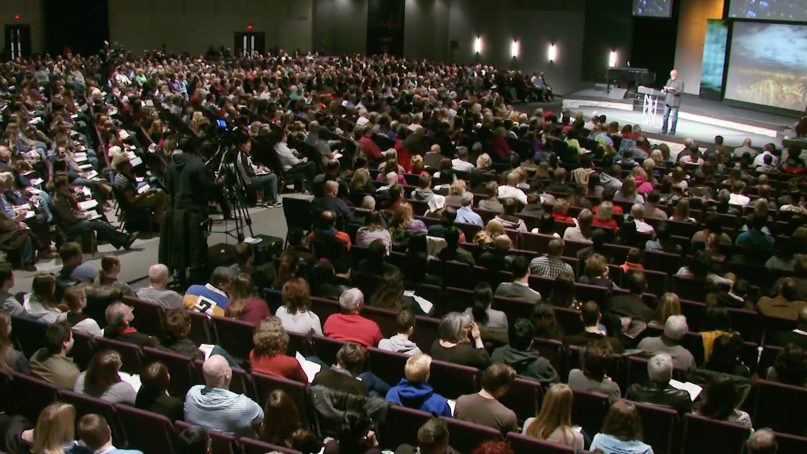
James MacDonald, top right, preaches at Harvest Bible Chapel. Video screenshot
“I received your letter and invitation for a private meeting,” Roys responded. “I am working on an investigative story about Harvest as you know. As is my professional practice, I will be reaching out to those named in the piece so they can offer their side of the story. Any conversations, though, will be recorded and will be on-the-record.”
MacDonald authored a guest column for Christianity Today last week making his case for “Why Suing is Sometimes the Biblical Choice.” While the Apostle Paul warned Christians against suing one another, MacDonald wrote, in some cases, going to court is necessary to stop someone from harming a church.
“We have called on authorities, in this case, the court in Cook County, to look carefully at the actions of these bloggers and rule on whether their publications against our church for six years have broken multiple civil laws,” he wrote.
The pastor said the church remains open to meeting with the defendants in person and ending the legal case. If the bloggers simply sat down with church leaders, he said, “they would learn of the positive changes that initially came from their critical approach.”
